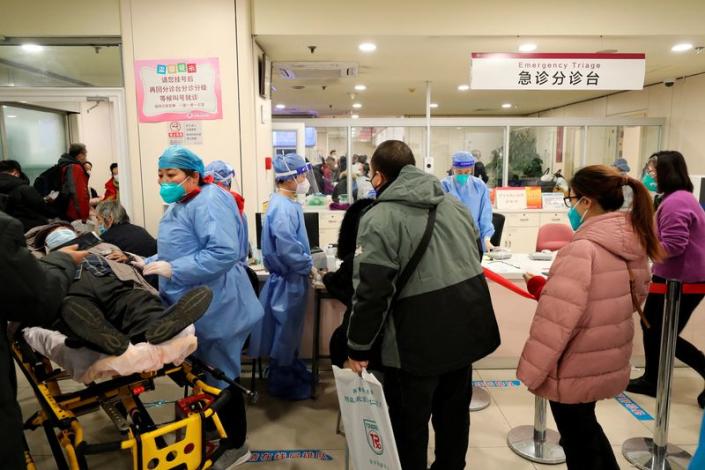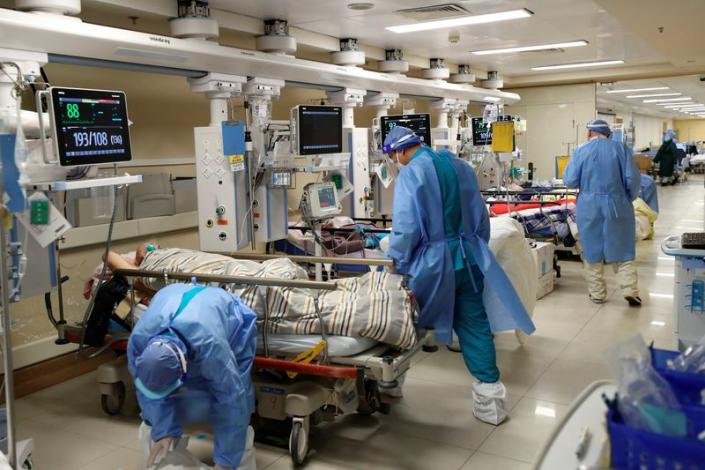Hospitals in China were extremely busy on Wednesday dealing with a huge surge of patients with Covid-19 after the country’s abrupt end to its strict lockdown and testing regime three weeks ago.
Beijing appears to have prioritized a reopening of its economy, given the negative impacts of the unpopular zero-Covid policy and the prolonged slump of the property sector.
But international health experts are watching the situation with concern, as Covid is now spreading largely unchecked and likely infecting millions of people a day.
The speed at which Covid rules were scrapped has left China’s fragile health system overwhelmed and prompted countries around the world, with access to more effective vaccines that have enabled them to “live with the virus”, to consider travel restrictions for Chinese visitors.
ALSO SEE:
Tokyo Says Visitors From China Must do Covid Tests – Japan Times

Long Queues, Little Covid Medicine
China reported three new Covid-related deaths for Tuesday, up from one for Monday – numbers that most experts say are unreliable and inconsistent with the experience of much less populous countries after they re-opened.
Staff at Huaxi, a big hospital in the southwestern city of Chengdu, said they were extremely busy caring for patients with Covid, as they have been ever since curbs were eased on December 7.
“I’ve been doing this job for 30 years and this is the busiest I have ever known it,” said one ambulance driver outside the hospital who declined to be identified.
There were long queues inside and outside the hospital’s emergency department and at an adjacent fever clinic on Tuesday evening. Most of those arriving in ambulances were given oxygen to help with their breathing.
“Almost all of the patients have Covid,” one emergency department pharmacy staff member said.
The hospital has no stocks of Covid-specific medicine and can only provide drugs for symptoms such as coughing, she said.
Zhang Yuhua, an official at the Beijing Chaoyang Hospital, said most recent patients were elderly and critically ill with underlying diseases. She said the number of patients receiving emergency care had increased to 450-550 per day, from about 100 before, according to state media.
Pictures published by state-run China Daily showed rows of mostly elderly patients, some breathing through oxygen tubes, receiving treatment from medical staff in white hazmat suits in the hospital’s intensive care unit.
Surge in Travel Queries
In a major step towards freer travel, China will stop requiring inbound travellers to go into quarantine from January 8, authorities said this week, prompting many Chinese, cut off from the world for so long, to check travel platforms.
But while online searches for flights spiked on Tuesday from extremely low levels, residents and travel agencies suggested a return to anything like normal would take some months yet, given worries about Covid and more careful spending because of the impact of the pandemic.
Moreover, some governments were considering extra travel requirements for Chinese visitors.
US officials cited “the lack of transparent data, including viral genomic sequence data” as reasons for doing so.
India and Japan would require a negative Covid test for travellers from mainland China, with those testing positive in Japan having to undergo a week in quarantine. Tokyo also plans to limit airlines increasing flights to China.
Asked about the travel requirements imposed by Japan and India, a spokesman for China’s foreign ministry said on Tuesday “Covid measures should be scientific, moderate and should not affect the normal flow of individuals”.
Factories Hit by Covid Wave
China’s $17 trillion economy is expected to suffer a slowdown in factory output and domestic consumption as workers and shoppers fall ill.
News of China re-opening its borders sent global luxury stocks higher, but the reaction was more muted in other corners of the market, as the world’s second-largest economy is likely to face subdued global demand in 2023.
US carmaker Tesla plans to run a reduced production schedule at its Shanghai plant in January, extending the restricted output it began this month into next year, according to an internal schedule reviewed by Reuters.
Tesla did not specify a reason for the planned production slowdown.
Once the initial shock of new infections passes, some economists expect Chinese growth to bounce back with a vengeance from what is this year expected to be its lowest rate in nearly half a century, somewhere around 3%.
Morgan Stanley economists expect 5.4% growth in 2023, while those at Goldman Sachs see 5.2%.
- Reuters with additional editing by Jim Pollard
ALSO SEE:
China Study Says mRNA Vaccines Could Save 1m Lives – SCMP
Beijing, Shanghai Resume ‘Normal Routine’ Amid Raging Covid
China’s Covid Crisis Seen Lasting For Two Months
250 Million Chinese Caught Covid in 20 Days, Say Officials – FT
























